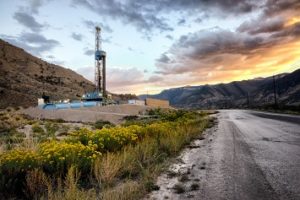By a vote of 51 to 49, the Senate rejected moving forward with a resolution that would have nullified the Bureau of Land Management’s (BLM) final rule to prevent waste of natural gas from venting, flaring, and leaks during oil and natural gas production activities on onshore federal and Indian leases (November 18, 2016, FR).

grandriver / E+ / Getty Images
H.J. Res. 36 had been introduced under the Congressional Review Act (CRA), which gives Congress the authority to disapprove an agency rule (i.e., ensuring that the rule will have no force or effect) for 60 days of Congressional session after the agency transmits that rule to Congress. The resolution had already passed in the House. However, three Republican Senators elected to vote with all 48 Democrats, giving opponents of the resolution the single-vote majority needed to defeat the measure.
Rulemaking Now Needed
The Senate vote does not mean the methane rule, which was issued by the Obama administration, will last long. Promptly after the vote, the Department of Interior (DOI), which houses the BLM, announced that it intends to suspend, revise, or rescind the rule given its “significant regulatory burden that encumbers American energy production, economic growth and job creation.” The rule had been listed for review in President Trump’s March 28, 2017, Executive Order on energy independence and economic growth.
“The vote today in the Senate doesn’t impact the Administration’s commitment to spurring investment in responsible energy development and ensuring smart regulatory protections,” said a DOI spokesperson.
But to revise or rescind the rule, which is now in effect, the BLM will need to go through a lengthy rulemaking process. An approved Congressional resolution to block the regulations would have taken effect upon the president’s signature.
Commonsense Measures Required
The BLM’s stated intent in issuing the rule was to reduce waste of natural gas from flaring, venting, and leaks from oil and gas (O&G) production operations on public and Indian lands. Under the rule, O&G producers must to take “commonsense and cost-effective measures” in line with industry technological advances that reduce losses of valuable natural gas that can produce revenue for taxpayers.
The rule was heavily criticized by industry, which claims it duplicates state requirements. Opponents also argued that the real intent of the rule is to control emissions of methane, a major greenhouse gas (GHG). This, they claimed, made the rule an air regulation, which should be the work of the EPA and is outside the authority of the BLM.
Passage Would Have Blocked Any Similar Rule
“Improving the control of methane emissions is an important public health and air quality issue, which is why some states are moving forward with their own regulations requiring greater investment in recapture technology,” said Senator John McCain (R-AZ). McCain was joined by Republican Senators Lindsey Graham (SC) and Susan Collins (ME) in opposing the resolution.
“I join the call for strong action to reduce pollution from venting, flaring and leaks associated with O&G production operations on public and Indian land,” McCain continued. “While I am concerned that the BLM rule may be onerous, passage of the resolution would have prevented the federal government, under any administration, from issuing a rule that is ‘similar,’ according to the plain reading of the Congressional Review Act. I believe that the public interest is best served if the Interior Department issues a new rule to revise and improve the BLM methane rule. I look forward to working with my colleagues who voted to proceed to the resolution today.”
Senator John Barrasso (R-WY), one of the resolution’s sponsors urged quick action by the DOI.
“I call on Interior Secretary Zinke to withdraw the rule immediately,” said Barrasso. “If left in place, this regulation will only discourage energy production, job creation, and economic opportunity across the West. The state of Wyoming and other leading energy producing states already regulate methane emissions. We don’t need this duplicative rule.”
Democratic Legislation
Across the aisle, Senator Ed Markey (D-MA) said “rejecting this Republican attempt to allow O&G companies to continue wasting natural gas owned by the American people will ensure that American taxpayers will not get burned. And it will ensure that we don’t lose control of managing methane emissions on public lands that contribute to climate change.”
Markey has introduced the FLARE Act, which would direct the DOI to issue regulations to reduce the venting and flaring of natural gas on public lands and ensure that taxpayers are compensated for this resource that they own.
